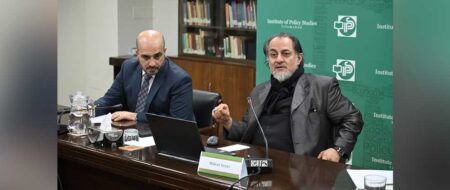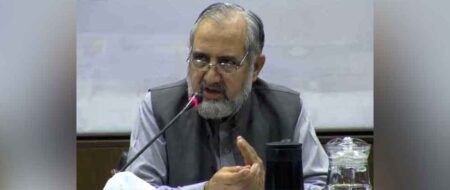Dr. Barnett Rubin Visits IPS
IPS hosted Dr. Barnett Rubin, Director of Studies & Senior Fellow at Center on International Cooperation (CIC), New York University, for three days from November 03-05, 2007. Dr. Rubin is a leading expert on Afghanistan, and served as special advisor to the UN Special Representative of the Secretary General for Afghanistan, Lakhdar Brahimi, during the negotiations (November-December 2001) that produced the Bonn Agreement. He is also a member of the Human Rights Watch Asia Advisory Committee. Using his eventful visit to IPS, a seminar on “The International Goals in Afghanistan,” chaired by Mr. Akram Zaki, former Secretary General, Ministry of Foreign Affairs, GoP, and a roundtable on “How Do We Generate Solutions to the Current Afghan Crisis?,” chaired by Barrister Saadia Abbasi, were organised to bring out the facts and analysis on the issue of Afghanistan. IPS organised a lecture of Dr. Rubin on “The Current Situation in Afghanistan” in Qauid-I-Azam University in collaboration with the History department of the University.
In the first event, “The International Goals in Afghanistan,” on November 3, 2007, Dr. Rubin stated that although the United States was the major actor in Afghanistan, there were many other actors i.e. NATO, UNO, World Bank and IMF working inside the troubled country. He mentioned that more than sixty countries and entities singed Afghanistan Compact but they had different goals in Afghanistan. Sometimes their interests collided with one another and hampered the project of rehabilitation and reconstruction. He maintained that a series of events from attacks on American embassies in Africa to the terrorist attacks of 9/11, compelled the US to attack Afghanistan along with the international community to curb the terrorism.
After his speech, distinguished participants including ambassador of Islamic Republic of Afghanistan H. E. Muhammad Anwar Anwarzai, commented on his presentation.
Mr. Akram Zaki concluded the session acknowledging that Mr. Rubin had mentioned some of the visible or declared goals of the international community. However, the great powers had some invisible or the actual goals which needed to be discussed as well. He added that there were serious questions in legal terms of the legitimacy of NATO and the US in this area.
On November 05, two events were organised. “Current Situation in Afghanistan” was held in Quaid-I-Azam University and chaired by Khalid Rahman, DG, IPS, while Dr. Waqar Ali Shah, Head of History Department, welcomed the guest. Dr. Razia Sultana, Asst. Professor, History Department, introduced Dr. Rubin to the audience. “How do we Generate Solutions to the Current Afghan Crisis?” was an in-house sitting of a group of experts on Afghanistan at IPS. In his lectures, Dr. Rubin maintained that a violence-ridden and war torn country like Afghanistan, security was the first and foremost objective.
He was of the view that without the establishment of peace, any project of reconstruction and rehabilitation of the country would be near to impossible. He suggested that the government of Afghanistan, the coalition forces and the indigenous Afghan leaders should sit together and find out ways and policies to bring peace in the country. Answering the questions, Dr. Rubin said that economic, social and infrastructural development in Afghanistan was the only possible route for the coalition partners to take in order to curb extremism and terrorism from the region.
He was of the view that people of Afghanistan did not see the coalition forces as liberators; they rather took them as invaders and conquerors. As long as these sentiments prevailed, resistance would not die down. A summary of Dr. Rubin’s seminars at IPS along with a summary of the comments made by distinguished participants in both events will be published in a special issue of Policy Perspectives during the first quarter of 2008.











